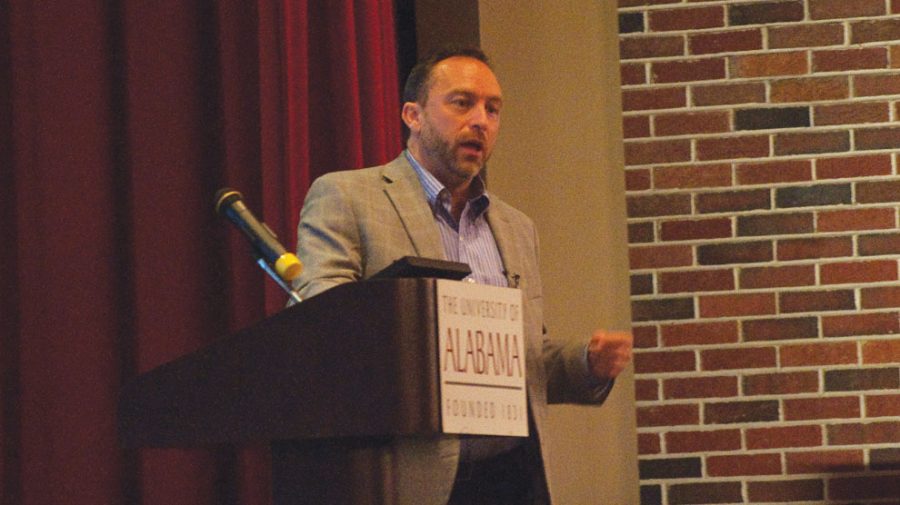There was standing room only left in the Ferguson Center theater as Jimmy Wales, a University of Alabama alumnus and founder of the world’s largest encyclopedia, Wikipedia, spoke as a part of the University’s Liberty and Power Lecture Series.
In 2006, Time Magazine named Wales one of the most influential people, and Wikipedia is the Internet’s seventh most popular website, receiving about 423 million hits per month.
“What I always say is, ‘Imagine a world in which every single person on the planet is given access to the sum of human knowledge, and that means in their own language,’” Wales said.
Since its launch in 2001, Wikipedia entries have become available in more than 180 languages, and Wales said that’s Wikipedia’s primary goal—to become a truly global project and provide countries that struggle with censorship and competing narratives in history a well-rounded, easily accessible encyclopedia.
For example, he said, many people don’t understand exactly what’s going on in the Middle East, even those who live there or have fought there.
“[It’s] valuable for everyone, on all sides, to understand the facts, and that’s the first step toward peace,” he said. “Liberty and power is quite important.”
Wikipedia is also helping more people become knowledgeable about history in general, he added.
“I think it’s really important that we are now moving into an era where ordinary people have greater access to the facts of various disputes throughout history so that they can learn more and decide [the truth] for themselves much more easily than they could in the past,” he said.
The site was banned for three years in China, though there are 302,228 Wikipedia entries written in Chinese languages, thanks to those who write them outside of the country.
“We had a strong community, and it was always growing,” Wales said.
“There are people in the world who are doing acts of heroism by editing Wikipedia.”
There are more than three million articles written in English on the site, he said, though they compose less that 20 percent of the encyclopedia. There are more than 500,000 articles written in German, French, Polish, Japanese, Italian, Dutch, Spanish and Portuguese.
However, students and professors alike question Wikipedia’s credibility, as there are more than 100,000 volunteer editors in addition to others who contribute periodically.
“The question of credibility versus not credible is too simplistic,” Wales said. “What we really need to think about is how to use Wikipedia appropriately.”
David Beito, associate professor of history and the founder of the lecture series, said there are all sorts of people who act as referees for the site.
“It’s an encyclopedia that has thousands of editors,” he said. “A regular encyclopedia has one editor, and everything is all planned.”
With Wikipedia, he said, anybody can make an entry, but the volunteer editors make sure what’s posted is accurate. The footnotes, Beito said, are what help users check the credibility of the information they’re consuming.
“You have to look at footnotes, and they can lead you to other pages that give more information,” he said. “It’s a source that can open doors, if you use it properly, to more sources.”
Alina Coryell, project manager for the lecture series, echoed Beito’s sentiments, saying using Wikipedia as a resource is a good jumping off point for research.
“It is a form of media, but not journalistic per se,” she said. “People find things on Wikipedia and get information from there.”
Joy Doriety, a senior majoring in Spanish, said she went to hear Wales speak to learn how the site got started and what events led up to it. However, she said she does question its reliability.
“I usually don’t use it in homework because most professors don’t accept it as a source,” she said. “Sometimes I’ll use it to supplement what I’ve learned in class, though.”
Byron Fewell, a senior majoring in political science, shared Doriety’s opinion.
“It’s a great source for finding other websites,” he said. “If I need sources, I go to Wikipedia and use the reference section.”
Though Wikipedia does not host advertisements, next year’s budget is about $20 million, Wales said.
“The vast majority of funding comes from the general public in more than 50 countries,” he said. “The average donation is about $30 per person. There are some philanthropic projects that contribute, and Google donated $2 million in the past year.”
Google is one of the most active contributors, Wales said, but there are no strings attached.
“Google’s whole business model depends on the Internet not sucking, and Wikipedia is a big site,” he said.
Wikipedia is not a textbook, Wales said; it’s not a library; it’s not an archive.
“Instead, it offers an essential summary of human knowledge,” he said.









